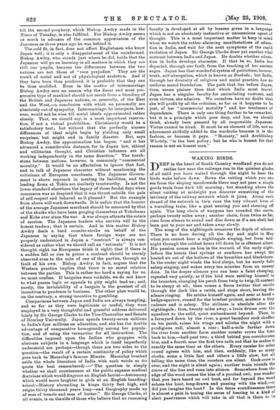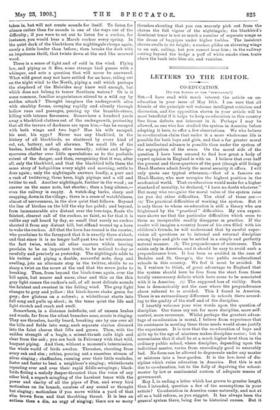WAKING BIRDS.
DEEP in the heart of South Country woodland you do not realise how near the railways run to the quietest glades of all until you have waited through the night to hear the birds wake before dawn. Dowu the cutting which you can see from the sloping meadowside there may not pass a single goods train from dark till morning ; but standing above the silent cutting at midnight you discover something of the intricacy of the railway network which it joins. Along each strand of the network in turn runs the tiny vibrant hum of a travelling train, like a gnat nearing you and sheering off again. The long chain of waggons has rounded the curve, perhaps twenty miles away ; another chain, from twice as far, rises from silence to sound and dies down as if a sea-shell had been put to your ear and taken away slowly.
The song of the nightingale measures the depth of silence. There is no hour during all the day and night in May when you cannot bear a nightingale singing, but from mid- night through the coldest hours till dawn he is oftenest silent. His passion comes on him in the warmth of the early night, before the breeze that springs at sundown has swept the heated air out of the hollows of the brambles and blackthorn. In the cooler night winds the bird sleeps, but he surely falls asleep singing, and wakes every ten minutes from an uneasy doze. In the deeper silences you can hear a faint cheeping, repeated very quietly, as if the bird were settling himself in the branches, changing his perch from twig to twig, ill content to be sleepy at all; then comes a fierce twitter that shrills through the dark like a rattle, and stops short, leaving the silence ringing. He settles himself again, and near at hand a hedge-sparrow, roused for the briefest protest, mutters a tiny cadence and is asleep. The stillness is absolute after the nightingale; then, twenty miles away, a train drums over the aqueduct to the solid, quiet embankment beyond. Then, in a farmyard down by the river, a great barndoor cock shuffles on his perch, raises his wings and salutes the night with a prodigious call, almost a roar ; half-a-mile further down the river from another farm another rooster crows the time back to him,—half-past two; a third behind you corroborates him, and a fourth near the first two calls out that he makes it exactly the same time as the others. Every rooster for miles round agrees with him, and then, suddenly, like so many clocks, some a little fast and others a little slow, but all telling the same time, the roosters are silent. Cock-crow is over, and the night is silent again; another train rounds the curve of the line and runs into silence. Somewhere from the edge of the wood comes the hiss of a perched owl; you wonder that you have heard no owl hoot, and far beyond the wood echoes the hoot, long-drawn and passing with the wind,—or did you imagine the hoot P In the tense soundlessness there is almost a pain in tuning the sense of hearing to a kind of alert passiveness which will take in all that is there to le
taken in, but will not create sounds for itself. To listen for silence rather than for sounds is one of the ways out of the difficulty; if you were to set out to listen for a cuckoo, for instance, you would hear a March cuckoo every spring. In the quiet dark of the blackthorn the nightingale cheeps again, surely a little louder than before; then breaks the dark with an impetuous thrill, that twists down at the end like screwed wood.
There is a sense of light and of cold in the wind. Flying low, and piping as it flies, some strange bird passes with a whimper, and sets a question that will never be answered. What wild guest may not have settled for an hour, riding out on the night wind to the North, piping a call which perhaps the shepherd of the Hebrides may know well enough, but which does not belong to tamer Southern waters ? Or is it some common, familiar acquaintance stirred to a wild cry by sudden attack ? Thought imagines the undergrowth alive with stealthy forms, creeping rapidly and silently through hollow runs and passages, peering up the bramble-stems, killing with intense fierceness. Somewhere a hundred yards away a blackbird clatters out of the undergrowth, protesting that all the terrors of darkness are upon him,—has he escaped with both wings and two legs ? Has his wife escaped, his nest, his eggs ? Never was any blackbird, in the history of all blackbirds, so shattered by every kind of cat, rat, battery, and all alarums. The small life of the bushes, huddled in sleep, stirs uneasily; robins and hedge- sparrows chatter over little speculations as to the probable extent of the danger, and then, recognising that it was, after all, only the blackbird, and that the blackbird tells them the same story of hobgoblins every night and morning, settle to doze again; only the nightingale answers loudly, a purr and a rush of twittering, three keen, high pipings and a rill and twitter to end. Another nightingale, further in the wood ; an answer on the same note, but shorter ; then a long silence,— even the railway is empty. A watch-dog barks, sharp and snapping, down in the village; there is a sense of watchfulness, almost of nervousness, in the slow quiet that follows. Beyond the line of birches on the hill the sky has paled; and beyond, from immeasurable airs distant over the tree-tops, floats the faintest, clearest call of the cuckoo, so. faint, so far that it is unlike any call heard by day, so small that surely no cuckoo shouted it from any distant hill, but elfland wound up a horn to wake the cuckoo. All that the horn has roused is the rooster, who proclaims to the farmyard that it is exactly three o'clock, and that since it is no longer half-past two he will announce the fact twice, which all other roosters within hearing proclaim to be an important truth, to be noticed to-day as carefully and precisely as yesterday. The nightingale adds to his twitter and piping a double, sorrowful note, deep and swelling, jots an alternate stop in the twitter, shrills to so eharp a twist on the screw at the end that the screw jerks to breaking. Then, from beyond the birch-trees again, over the hill again, but nearer and surer, clear and thin as the thin grey light comes the cuckoo's call, of all most delicate sounds the faintest and sweetest in the falling wind. The grey light changes to grey and yellow : the birch-leaves shake green for grey; dew glistens on a cobweb ; a whitethroat starts into full song and pulls up short ; in the tense quiet the life and light stretch and reach and swell.
Somewhere, in a distance indefinite, out of unseen brakes and woods, far from the silent branches near, music is ringing. They are thrushes, hardly heard, breaking one by one over all the hills and fields into song, each separate clarion dimmed into the faint chorus that lifts and grows. Then, with the sudden strength of a bugle, a missel-thrush calls high and clear from the oak ; you are back in February with that wild, buoyant piping. And then, without a moment's intermission, the whole world of birds awakes. Thrushes, shouting from every oak and elm ; robins, pouring out a ceaseless stream of silver singing ; chaffinches, running over their little roulades, faster and faster to beat a neighbour's singing; whitethroats repeating over and over their rapid fiddle-scrapings; black- birds fluting a melody deeper-throated than the voice of any Other bird, a superb mingling of the harshest tenor with the power and clarity of all the pipes of Pan, and every bird motionless on its branch, careless of any sound or thought but singing; motionless if you move within .a yard of that shin brown form and that throbbing throat. It is less an anthem than a din, an orgy of singing; there are so many thrushes shouting that you can scarcely pick out from the chorus the full vigour of the nightingale; the blackbird's dominant tenor is not so much a number of separate songs as the drone of bagpipes under higher trebles. The insistent chorus swells to its height; a cuckoo glides on shivering wings to an oak, calling, but you cannot hear him ; in the railway cutting beyond the hedge a puff of white smoke rises, trails above the bank into blue air, and vanishes.







































 Previous page
Previous page